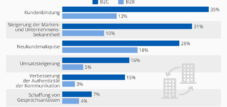White paper & analysis: Optimization of content marketing strategies and a well-thought-out strategy for B2B companies
Language selection 📢
Published on: May 23, 2024 / update from: May 23, 2024 - Author: Konrad Wolfenstein

A representative analysis clearly shows that increasing brand recognition and awareness is the primary goal of content marketing strategies in both the B2B and B2C sectors - Image: Xpert.Digital
🚀 Between ambition and reality: The challenges of B2B companies in content marketing
💡 Content as a king's path to brand awareness: goals and obstacles in B2B and B2C marketing
An in-depth analysis of the use of content marketing strategies clearly shows that the increase in brand awareness and the achievement of higher "awareness" are the main goals in both B2B and B2C sectors. B2B companies in particular strive to publish more content, but are faced with numerous challenges that prevent them from.
🚧 challenges in B2B content marketing
The main reason that prevents B2B companies from publishing content is not primarily financial but time resources. While 37 % of companies state financial restrictions as an obstacle, 85 % note that they simply lack the time to regularly create high -quality content. This shows that time management and efficiency increases are decisive factors for the success of content marketing strategies in the B2B area.
💰 Budgeting and resource assignment
Over half of the companies provide up to 15 % of their total marketing budget for content marketing. This investment underlines the importance of content marketing in modern corporate management. The clear trend is that companies are increasingly investing in high -quality content in the production in order to achieve their goals in terms of brand awareness and customer loyalty.
🛠️ Strategies for coping with challenges
In order to counteract the temporal bottlenecks, many companies rely on different strategies. A proven approach is cooperation with specialized agencies such as Xpert.digital. These agencies not only offer expertise in the area of content creating, but also take on the strategic planning and implementation of content marketing measures. This enables companies to concentrate on their core competencies while at the same time benefit from the advantages of a professionally managed content marketing strategy.
🤝 xpert.digital as a partner in the B2B area
Xpert.digital is particularly an optimal partner in the B2B sector of industry, mechanical engineering, photovoltaics and logistics/intralogistics. By providing content marketing services, Xpert.digital companies supports their market presence to strengthen their market presence and develop effective communication strategies. An outstanding feature of Xpert.digital is the in-house industrial hub or industrial blog. This not only serves as a platform for the publication of content, but also acts as a brand ambassador and industrial influencer.
🌐 Advantages of the Xpert.digital industrial hub
The Xpert.digital industrial hub offers a variety of advantages for companies that want to optimize their content marketing strategies:
Increase range
By publishing content on the industrial hub, companies can reach a broader target group and significantly increase their brand awareness.
Express expertise and trust
Regular contributions to industry -specific topics position companies as experts in their field and strengthen customers' trust.
SEO advantages
High quality content on an established platform such as the industrial hub improves visibility in search engines and contributes to increasing organic traffic.
Integration of symbols
The industrial hub supports the integration of sales and marketing (symbols) by bringing both areas through well-planned and implemented content strategies.
🏢 The role of content marketing in modern B2B
Content marketing has established itself as an indispensable tool to achieve business goals. By providing relevant and valuable content, companies can effectively address their target group, build and maintain customer relationships, and strengthen brand loyalty. Especially in the B2B area, where the decision-making processes are often more complex and lengthy, high-quality content plays a crucial role.
A successful content marketing approach in the B2B area includes several components:
Targeted content
Contents must be tailored to the needs and problems of the target group. This requires a profound examination of the respective industries and their specific challenges.
Create added value
The content provided should not only be informative, but also useful for readers. This can be achieved through detailed specialist articles, white papers, case studies and practical instructions.
Multi -channel approach
The content should be spread via different channels to maximize the range. This includes the company website, blogs, social media, email newsletter and special industry portals.
🔮 Long-term effects and trends in content marketing
The importance of content marketing will continue to increase in the coming years. Industry experts predict that the proportion of marketing budget that is spent on content marketing will continue to rise. The focus will be on personalized and interactive content. Technologies such as artificial intelligence and data analyzes will make it possible to create and spread even more targeted and relevant content.
Another important trend is the increased use of video content. Videos offer an effective way to present complex topics clearly and appealing. They promote the commitment of the target group and can be integrated into the content marketing strategy in a variety of ways.
📊 A well thought-out content marketing strategy for B2B companies
In summary, it can be said that a well thought-out content marketing strategy for B2B companies is crucial in order to increase their brand awareness and to build long-term customer relationships. Challenges such as the lack of temporal resources can be mastered by working with specialized partners such as Xpert.digital. Through the use of innovative platforms such as the industrial hub and the integration of symceting, companies can optimize their content strategies and strengthen their market position sustainably. You should always make sure to produce content that offers real added value and are precisely tailored to the needs of your target group. The continuous adaptation to new trends and technologies will be crucial in order to remain successful in the constantly changing landscape of content marketing.
📣 Similar topics
- 🚀 Increase in brand awareness through B2B content marketing
- 🕒 Time management as the key to success in content marketing
- 💰 The role of the budget in B2B content strategies
- 🤝 Advantages of cooperation with content marketing agencies
- 🏭 Xpert.digital: The ideal partner for industrial content marketing
- 🌐 The influence of the industrial hub on the brand presence
- 🔍 SEO advantages through high-quality content on platforms such as the industrial hub
- 📈 Long-term trends and the future of content marketing
- 🎥 the growing importance of video content in the B2B area
- 📊 A comprehensive strategy for successful B2B content marketing
#️⃣ hashtags: #b2bcontentmarketing #xpertdigital #contentstrategy #markenknelligung #industriehub
Our recommendation: 🌍 Limitless reach 🔗 Networked 🌐 Multilingual 💪 Strong sales: 💡 Authentic with strategy 🚀 Innovation meets 🧠 Intuition
At a time when a company's digital presence determines its success, the challenge is how to make this presence authentic, individual and far-reaching. Xpert.Digital offers an innovative solution that positions itself as an intersection between an industry hub, a blog and a brand ambassador. It combines the advantages of communication and sales channels in a single platform and enables publication in 18 different languages. The cooperation with partner portals and the possibility of publishing articles on Google News and a press distribution list with around 8,000 journalists and readers maximize the reach and visibility of the content. This represents an essential factor in external sales & marketing (SMarketing).
More about it here:
📌 Other suitable topics
🚀 Measures to optimize content marketing strategies
🔍 In order to further increase the efficiency and effectiveness of content marketing strategies, B2B companies should consider various measures:
1. Develop audience personas
By creating detailed buyer personas, companies can gain deeper insights into the needs, challenges and behaviors of their target group. This enables more precise alignment of the content and greater personalization.
2. Content planning and calendar
A structured content plan helps to optimize the publication process and ensure even provision of relevant content. Through preliminary planning, companies can better react to seasonal trends and industry -specific events.
3. Content recycling
In order to reduce the time required, existing content can be reused in different ways. For example, blog articles can be converted into white papers, infographics or video scripts in order to maximize the range and to meet various preferences of the target group.
4. Use automation tools
The use of automation tools can help companies to make routine tasks such as planning and publishing articles, sending newsletters and analysis of the performance data more efficiently. This leaves more time for further development and strategic planning.
📊 Success key figures and analysis in content marketing
📈 In order to measure and continuously improve the success of content marketing measures, a careful analysis is indispensable. Various key figures (KPIS) play an important role here:
Reach and commitment
These KPIs show how many people see the content and how strongly they react to it. Metrics such as page views, length of stay, click rate and social shares are relevant here.
Lead generation
The number of generated leads and their quality are essential indicators for the effectiveness of the content strategy. Forms, registrations for newsletters and downloads from resources are typical of measuring sizes.
Conversion rate
The conversion rate shows how many of the generated leads actually become customers. This is a direct reference to the economic benefits of content marketing efforts.
SEO performance indicators
The positioning in search engines, organic traffic and the number of backlinks provide information about how well the content is found on the Internet and contribute to brand awareness.
💼 The importance of customer loyalty in B2B content marketing
Another decisive goal of content marketing in the B2B area is customer loyalty. Since B2B sales are often the long-term nature and contain recurring businesses, care for existing customer relationships is of particular importance. High -quality content can be supportive here by continuously offering the customer added value and keeping them up to date through news and developments.
Regular updates and deep insights into industry development are particularly effective in this context. White papers, technical documentation and exclusive webinars can help to inform customers and strengthen their trust. Success Stories and Case Studies, which represent concrete problem solutions and success stories from practice, are also valuable content for customer loyalty.
🛰️ Technological trends and future developments
The future of content marketing will be strongly shaped by technological innovations. Some of the most important trends include:
Artificial Intelligence (AI)
AI-supported tools can help create content that is even more targeted to the needs of users. By analyzing large amounts of data, personalized content can be created and offered in real time.
Virtual Reality (VR) and Augmented Reality (AR)
These technologies offer new, immersive opportunities for content experience. In the B2B area, VR and AR can be used for product demonstrations, virtual trade fairs and interactive training.
Interactive content
Contents that encourage interactivity increase users' commitment. Examples of this are interactive infographics, quizzes or personalized video experiences.
Voice Search and Smart Speakers
With the increasing spread of voice assistants, content must also be optimized for language search. This requires adaptation of the SEO strategies and the creation of content that are suitable for spoken search queries.
💡 Content marketing for B2B companies
Overall, content marketing for B2B companies is a powerful weapon to increase brand awareness, effectively achieve the target group and to build long-term customer relationships. Despite the challenges, especially in the area of temporal resources, there are clear ways, such as through strategic planning, the use of automation tools and the cooperation with specialized partners, these hurdles can be overcome.
The continuous analysis and adaptation of the strategies to new technological trends and changing market requirements will be crucial in order to exist in the competition and to be sustainable. With the right measures and a clear focus on the needs of the target group, every company can fully exploit the potential of content marketing and position itself as a leading player in its industry.
📣 Similar topics
- 🎯 Strategies for the effective development of buyer personas
- 🗓️ The role of content calendars in the marketing strategy
- ♻️ Creative methods of content recycling
- 🛠️ Automation tools in content marketing: an overview
- 📈 Analysis and measurement of success in content marketing
- 🤝 Customer loyalty through content marketing in the B2B sector
- 🚀 Future technologies in content marketing: KI, VR and AR
- 📖 case studies and best practice in B2B content marketing
- 💡 The importance of targeted content for customer acquisition
- 🔍 SEO optimization and content marketing: a Winning strategy
#️⃣ hashtags: #contentmarketing #b2bmarketing #digitaletransformation #customer binding #technology trends
💡📊 Analysis of brand awareness and awareness
📊 The analysis clearly shows that the increase in brand awareness and awareness is the primary goal of content marketing strategies both in the B2B and B2C sector. Here the data collected are summarized in detail:
🎯 B2C (business-to-consumer)
- Increase brand awareness/awareness: 84%
- Generate leads: 53%
- Build trust and credibility: 73%
- Inform/form target groups: 63%
- Opinion leadership/thought leadership: 10%
- Strengthen brand loyalty and customer loyalty: 71%
- Support product launches: 29%
- Generate event participants: 22%
- Employer branding: 20%
- Win newsletter subscribers: 23%
- Build and maintain investor relations: 10%
🎯 B2B (business-to-business)
- Increase brand awareness/awareness: 76%
- Generate leads: 75%
- Build trust and credibility: 72%
- Inform/form target groups: 65%
- Opinion leadership/Thought Leadership Erlangen: 44%
- Strengthen brand loyalty and customer loyalty: 44%
- Support product launches: 26%
- Generate event participants: 24%
- Employer branding: 24%
- Win newsletter subscribers: 21%
- Build and maintain investor relations: 10%
🧩 Methodology of the analysis
- Population: 262 people
- Duration of the survey: 16.01.2024 - 11.02.2024
- Sales channels: Statista, CMCX and the Content Marketing Forum and LinkedIn
💡 Insights and implications
1. Priorities for B2B
Brand awareness and trust are essential, followed by the customer loyalty and formation of the target group. Thought Leadership is relatively less prioritized.
2. Priorities for B2C
Almost equal priority for brand awareness and leads, with great importance on trust formation and customer loyalty. Thought Leadership plays a larger role than in the B2B area.
🛠️ Strategic recommendations
These strategic goals and recommendations should serve as guidelines in order to plan and carry out content marketing measures in a targeted and efficient manner.
1. Choose content formats and channels
In the B2B area of WhitePapers, case studies and informative webinars should be used for increasing brand awareness, while social media campaigns, influencer marketing and interactive content such as videos and competitions can be particularly effective in the B2C area.
2.
Authentic success stories, customer reviews and transparency in relation to processes and philosophy are crucial for both areas.
3. Lead generation
In the B2B area through targeted email marketing campaigns and qualified lead-nurturing processes, while in the B2C area Landing Pages, special promotions and freebies are useful.
4. Target group formation and information
- B2B: White papers, technical reports, webinars and expert interviews can be used to inform and further train the target group about specific topics.
- B2C: blog posts, explanatory videos, and interactive content such as quizzes or infographics are suitable to inform the target group and to expand their knowledge.
5. Strengthening brand loyalty and customer loyalty
- B2B: Regular newsletters, personalized email communication and exclusive content for existing customers can be strengthened.
- B2C: Loyalty programs, personalized offers and regular engagement initiatives (such as community events or social media interactions) help to increase brand loyalty.
6. Opinion leadership/thought leadership
- B2B: Publications in specialist journals, participation in industrial events and the keeping of lectures can strengthen the position as a pioneer in the industry.
- B2C: Thought Leadership can be achieved through collaborations with well -known personalities in the area (influencer, experts) and the publication of studies and innovative content.
7. Support of product launches
- B2B: Successful product launches can be supported by detailed case studies, webinars and detailed product demos.
- B2C: Teaser campaigns, countdown initiatives and social media previews increase the anticipation for new products.
8. Generate event participants
- B2B: Direct marketing, targeted invitations to LinkedIn and cooperation with industry -relevant organizations are effective.
- B2C: Evalterly designed event pages, social media advertising and collaboration with brand ambassadors support the acquisition of participants.
9. Employer branding
- B2B: Publications on corporate culture, employee successes and participation in careering increase employer branding.
- B2C: Stories about employees, influencers who represent the company culture, and career environments on social media and the company website help to promote a positive employer image.
10. Covering of newsletter subscribers
- B2B: High -quality guidelines, exclusive industry reports and regular updates on relevant topics seem attractive.
- B2C: Competitions, exclusive offers and discounts for subscribers motivate to register.
11. Building and maintaining investor relations
- B2B and B2C: Transparent communication about corporate developments, regular financial reports and direct channels for investor inquiries are crucial.
📈 Success metrics and continuous improvement
The performance metrics should be clearly defined and regularly monitored for both areas. Important KPIS (key performance indicator) could be:
- Increasing website traffic
- Engagement rates (likes, shares, comments)
- Conversion rates
- Number of generated leads
- Customer bond rate
- Number of new newsletter subscribers
Successful content marketing requires constant analysis and adaptation. The regular review of the KPIs and the feedback from customers and target groups enables the strategy to flexibly adapt and continuously improve.
📊 conclusion
The present analysis shows that the increase in brand awareness and awareness in the focus of content marketing strategies for both B2B and B2C companies is. With tailor-made content and targeted approaches, companies can achieve their other goals such as lead generation, trust formation and customer loyalty, creating sustainable and strong brand presence.
📣 Similar topics
- 🌉 Bridges between B2B and B2C: Instructions for brand communication
- 💖 The power of emotions: emotionalization in B2B brand communication
- 📚 Stories that sell: storytelling as a tool in B2B
- 🎯 Personalized experience: Customer centering in B2B marketing
- 📲 Digital dominance: Social media in the B2B brand strategy
- 🚀 Learning from B2C, mastering B2B: Success strategies for brand communicators
- 🌟 Authenticity and emotional bond: new ways in B2B marketing
- 🤖 Artificial intelligence and data analysis: Revolution in the B2B customer experience
- 📈 create strong brands: the transformation of B2B communication
- 🌐 The digital turn: future -oriented role of social media in B2B
#️⃣ hashtags: #B2B brand communication #emotionalization in business #Storytellingb2b #customer experience #Digital presenceb2b
🏭🔄 Industry influencer: Industry hub as a blog tip & topics portal for industry, mechanical engineering, logistics, intralogistics and photovoltaics
In the constantly changing and increasingly complex smart world of industry, there is a further development: the industry influencer. But what exactly is an industry influencer? This is a hub that serves as both a blog and a topic portal. This concept is particularly valuable for sectors such as industry, mechanical engineering, logistics/intralogistics and photovoltaics. Let's delve deeper into this topic.
More about it here:
We are there for you - advice - planning - implementation - project management
☑️ SME support in strategy, consulting, planning and implementation
☑️ Creation or realignment of the digital strategy and digitalization
☑️ Expansion and optimization of international sales processes
☑️ Global & Digital B2B trading platforms
☑️ Pioneer Business Development
I would be happy to serve as your personal advisor.
You can contact me by filling out the contact form below or simply call me on +49 89 89 674 804 (Munich) .
I'm looking forward to our joint project.
Xpert.Digital - Konrad Wolfenstein
Xpert.Digital is a hub for industry with a focus on digitalization, mechanical engineering, logistics/intralogistics and photovoltaics.
With our 360° business development solution, we support well-known companies from new business to after sales.
Market intelligence, smarketing, marketing automation, content development, PR, mail campaigns, personalized social media and lead nurturing are part of our digital tools.
You can find out more at: www.xpert.digital - www.xpert.solar - www.xpert.plus


































